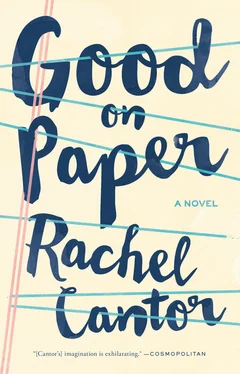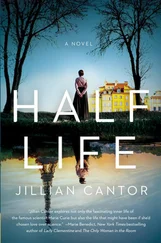Unless he already was involved .
Could it be? Had Benny referred Romei to me?
It made sense. They knew each other; Benny had given Romei my number. Benny was a literary guy — he knew lots of folks. Maybe Romei asked if he knew a translator. Maybe Benny hadn’t wanted to admit such a large favor. His involvement would explain why Romei had taken a chance on an unknown — he’d trusted Benny’s judgment!
All Benny had wanted was to do something nice for me!
I stood up again, ready to apologize. We could begin again, I thought, but then:
No. He couldn’t have given Romei my name! He didn’t know about my Dante translation, he’d never heard of Vita Nuova .
Might he still have recommended me? And I just happened to be an expert on an obscure work of Dante no one but me has ever read? Too large a coincidence.
A drop of rain landed on my nose.
I had it all wrong. It wasn’t up to me to reach out to Benny. It was up to him to come to me, to come clean. He hadn’t, he’d had his chances and he hadn’t.
Rosh Hashanah, my ass.
30. INTO THE ITALIAN SUNSET

The next morning, we sent Andi off for her first day of school. Ahmad knelt beside her, straightened her jumper, and handed her a notebook and pen — a foot-long pen with a red-knit pom-pom dangling from its end. He insisted it was his family’s tradition to give third graders notebooks so they could record their observations. Because they were “old enough” now, whatever that meant. Andi nodded solemnly, her eyes wide. I glared at Ahmad as Andi walked out the door clutching her notebook — looking, no doubt, for something to observe.
How like Ahmad, to show me up with school supplies!
•
More pages had arrived overnight, as promised: more “Screen,” a whole page and a half.
I didn’t want to read a scene in which a radiant Esther proclaims she must be free, free, free ! Her husband begs her to stay, her child weeps in a corner, but proud Esther will not be moved! She walks with Romei into an Italian sunset. Or so I imagined, as I settled onto the loveseat.
Romei surprised me.
Esther and her narrator have not spoken of the future. Like all literary lovers, they live in an eternal present. In a poem called “Au(to) bade,” they curse the arrival not of the dawn but of the child’s school bus. So it’s a shock — to them and to us — when they return to Esther’s one day to find the apartment empty, the husband not in Palermo as planned, the child not in school, but both of them gone, their clothes gone, the jewelry given to Esther by her husband gone, her passport gone. All that remains, besides Esther’s clothes: her translation, a canceled bankbook, a manila envelope she doesn’t recognize.
Inside the envelope, photographs of the happy couple dating back to the fall; also, a letter from a family friend, a lawyer, assuring Esther that she’d forfeited her maternal rights and her rights to spousal support, begging her for the sake of all concerned not to press the issue — not that she has the money with which to return to the U.S., much less hire an attorney: her husband has left her penniless.
You have what you want, a note from him says. Now live with it.
Reminiscent of Dante’s karmic economy, the punishment horribly fitting the crime, this note suggests that our lovers are now in Hell. Be careful what you wish for!
And with this, Romei shifts from the present to the past tense: the narrator and Esther plunge into time, out of their lyric self-absorption, into something far more dynamic.
I imagined that at this point they turn to each other, knowing they are stuck with each other, their dream become nightmare. Game won and lost, they had their cake, now they had to eat it. I imagined they return to Romei’s silently, having lost their ability to speak. I imagined this but didn’t know: the section ended with the envelope and the note.
For the first time, I found myself feeling something for Esther and Romei — I wanted to read on. Yes, the husband was the injured party, yes, he had a right to be angry. But his revenge was complete and irrevocable. It didn’t allow for the possibility of change! Esther couldn’t explain herself, or consider what she might lose. The coldness of it curled my toenails.
When my telephone rang, I answered it, unguarded.
They say we’re obligated to ask three times for forgiveness, Benny said. Then the sin is on the head of the obdurate one.
Come over, I said. I’ll make us some tea.
31. WATCH THE DING DONG, DEAR

Benny and Andi arrived at the front door together.
You’re Andrea, right? I could hear him asking from the hallway.
I’m not saying, Andi said. I looked out the peephole. She was squatting in her Paddington raincoat and rain boots, rooting through her backpack with her good hand, I assumed for her keys. Raindrops hung from the tips of Benny’s beard.
Good girl, Benny said. Your mama must be proud of you.
She is, Andi said, pulling out a mashed Ding Dong. Do you know her?
I do if you’re Andrea.
You’re trying to trick me, she said. I’m not stupid.
Benny was still laughing when I opened the door.
•
I introduced him as Uncle Benny , which Andi didn’t appreciate. She’d put her Ding Dong on a piece of Ahmad’s china, and was eating it on the couch with a knife and fork.
I know him already from the store. Why does everyone want to be my uncle?
Because you’re such a great kid, I said.
If you say so.
Then we heard about her new teacher, Mrs. Chao, who was very nice. Look! she added, and extended her cast so I could see additional names written in grape and apricot.
Are you going to have Ovidio sign?
Mo-omm! she protested, making at least three syllables of the word.
Watch the Ding Dong, dear — we don’t want it on the sofa.
For some reason, this cracked Benny up.
Is he okay? Andi asked when Benny couldn’t stop laughing. His beard jiggled, his long legs stretched out around the legs of the coffee table. Whaaat? she asked, smiling. What’s the joke, Mom, tell me!
I was giggling too.
Mo-omm, tell me! Then Andi was laughing, Benny was howling and holding his stomach.
Watch the Ding Dong, dear! was all he could say.
•
That was great, he said, when Andi went to wash her plate. Laughing is better than sex, had you noticed?
Well, it’s less complicated, I said, thinking that was the strangest thing I’d ever heard.
Then from the kitchen, a shattering: china smashing on an Italian tile floor.
Oops, I heard my daughter say. Oh, no.
Shit, I said.
Ahmad’s antique Russian porcelain. Andi shouldn’t have been using it. I should have stopped her. I was so happy to see Benny, I hadn’t registered what she was doing.
You okay? I said as I went to her.
She looked up, unable to move. Her feet were bare — on her toes, sparkly blue nail polish. She looked scared, crouching, as if ready to leap. Her lower lip trembled.
Don’t move, I said. I’ll get something to sweep that up, but before I could turn, Benny had swooped Andi into his arms. She began to wail: Put me down! Put me down from here! pounding him with her good fist till he placed her a safe distance from the broken plate.
Читать дальше













